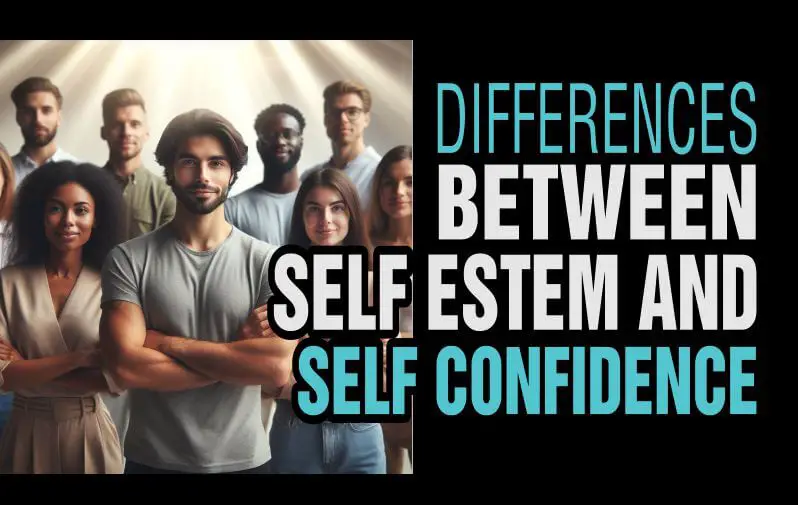Last updated on February 24th, 2025 at 02:26 pm
The difference between self esteem and self confidence might be subtle, but it is different enough they have different meanings.
Self esteem and self confidence are often used interchangeably in everyday conversations.
While they are closely related, it is important to recognize that these terms convey distinct meanings.
Both self esteem and self confidence play crucial roles in your mental well-being and personal growth.
In this blog post, you will learn the subtle differences between these two concepts, exploring their definitions, origins, development, and impact on our lives.
Related: Confidence vs Arrogance
Table of Contents
- Definitions
- Origin and Development of Self Esteem and Self Confidence
- Difference between Self Esteem and Self Confidence
- Frequently Asked Questions
- Final Thoughts
Definitions
Self Esteem
Self esteem refers to an overall evaluation of one’s worth or value as a person.
It covers feelings of self-respect, self-acceptance, and self-worth. Self esteem is largely influenced by your childhood experiences, parental relationships, achievements, and societal standards.
Self Confidence
On the other hand, self confidence is how you perceive your ability to complete specific tasks or achieve goals.
We hear people talk about confidence when someone shows ability in a task without fear or doubt.
Self confidence is believing in your abilities, skills, and judgment. It is the assurance that one can achieve success and overcome obstacles.
It is an internal sense of self-assurance that arises from an individual’s conviction in their worth.
It is situation-specific and can vary across different areas of life, such as work, social interactions, or personal challenges.
Self confidence is built through experience, knowledge, and the belief that we possess the necessary skills and competence.
Related: How to Boost Self Confidence and Self Esteem
Origin and Development of Self Esteem and Self Confidence

The origin of self esteem and self confidence can be traced back to various factors and experiences that shape your perception of yourself.
Here are some key factors that influence the development of self-esteem and self-confidence:
1. Childhood Experiences
Early interactions and experiences with parents, caregivers, and other significant figures play a crucial role in building a foundation for self-esteem.
2. Social Interactions and Feedback
Social interactions and feedback from peers, teachers, and other influential individuals during childhood and adolescence can significantly impact self-esteem.
Positive social experiences, such as being accepted, appreciated, and achieving success, can enhance self-confidence, while negative experiences, criticism, or rejection can lead to lower self-esteem.
3. Personal Achievements
Accomplishments and successes in various areas of life, such as academics, sports, arts, or personal goals, can boost self esteem and self confidence.
These achievements provide evidence of competence, capability, and value, reinforcing positive beliefs about oneself.
Related: Signs of Low Self-esteem in Men
4. Realistic self perception
An accurate understanding and acceptance of your strengths, weaknesses, and limitations are crucial for developing self esteem and self confidence.
Being aware of personal qualities and skills helps individuals set realistic expectations and recognize their areas for growth, contributing to a sense of authenticity and confidence.
5. Media and Societal Influences
Media, culture, and societal norms can influence self esteem and self confidence.
Unrealistic standards of beauty, success, or social acceptance portrayed in media can lead to comparison, self-doubt, and lower self-esteem.
Societal expectations and pressures can also impact an individual’s beliefs about their worth and abilities.
Related: Low Self Confidence Signs and Causes
Difference between Self Esteem and Self Confidence

Self esteem and self confidence develop and evolve throughout your life, shaped by various internal and external factors.
During childhood, your self esteem foundation is formed through the quality of your relationships, parental encouragement, and validation.
Positive experiences and praise encourage a healthy sense of self-worth, while negative experiences can hinder self esteem development.
As we grow older, our self confidence is shaped through accomplishments, feedback, and overcoming challenges.
It is important to note that fostering self esteem and self confidence requires ongoing attention and deliberate efforts, even during adulthood.
Interplay and Impact
While self confidence and self esteem are distinct concepts, they heavily influence each other.
Higher self esteem can positively contribute to self-confidence, as individuals who value and respect themselves are more likely to believe in their abilities and take risks.
Conversely, low self esteem may hinder self-confidence, leading to self-doubt and a fear of failure.
However, it is possible to possess high self confidence without having high self-esteem.
For instance, a person may excel professionally but still experience self esteem issues due to underlying personal insecurities.
Self esteem and self confidence both play significant roles in our personal growth and overall well-being.
If you have healthy self-esteem, you are more likely to have positive relationships, make better choices, and handle setbacks effectively.
Conversely, low self esteem can lead to feelings of inadequacy, depression, anxiety, and self-destructive behaviors.
Similarly, those who exhibit self confidence are more likely to take on new challenges, persevere in the face of adversity and achieve their goals.
When faced with failures or setbacks, confident individuals are more likely to bounce back, learning from their mistakes and pushing forward.
| Self esteem | Self confidence |
|---|---|
| 1. Definition: Self esteem refers to how you value yourself and your overall sense of self-worth. | 1. Definition: Self confidence pertains to the belief in your abilities, skills, and competence in specific areas or activities. |
| 2. Internal evaluation: It is an internal evaluation of yourself and involves your beliefs and feelings about your abilities, strengths, weaknesses, and overall value as a person. | 2. Task-specific: It is task-specific, meaning it can vary depending on the situation or domain. You can be confident in your abilities in one area but lack confidence in another. |
| 3. Global assessment: Self esteem is often a global assessment, meaning it covers a view of yourself in various areas of life, such as relationships, work, appearance, intelligence, and more. | 3. Performance-based: Self confidence is often based on past experiences, achievements, and successful outcomes. It can be developed through mastery and experience in a particular domain. |
| 4. Stability: Self esteem tends to be relatively stable and enduring over time, as it is based on the overall perception of oneself. | 4. Temporary fluctuations: Self confidence can fluctuate based on the situation or context. It may rise or fall depending on various factors like preparation, feedback, environment, and other external influences. |
| 5. Dependent on external factors: Self esteem can be influenced by external factors like validation, social acceptance, and feedback from others. It can be affected by success or failure in specific domains. | 5. Independent of self-worth: While self confidence can contribute to your overall self esteem, it is not directly related to you inherent worth as an individual. |
| 6. Beliefs and self-image: It involves a person’s beliefs, thoughts, and perception of themselves, affecting their self-image. | 6. Behaviors and actions: Self confidence is often evident in a person’s behaviours, actions, and choices. It affects how one approaches challenges, takes risks, and persists in the face of obstacles. |
Frequently Asked Questions
Which comes first self esteem or self-confidence?
Self esteem typically comes before self-confidence, as it involves a fundamental sense of self-worth, while self confidence is the belief in one’s abilities.
What is an example of self esteem and self-confidence?
An example of self esteem is feeling inherently valuable, while self confidence is exemplified by believing in one’s skills or knowledge.
Can you have high self esteem but low confidence?
Yes, one can have high self esteem but low confidence, feeling worthy but lacking belief in specific abilities or actions.
What is the difference between self esteem and self confidence psychology today?
According to Psychology Today, self esteem is about overall self-worth, while self confidence is specific to beliefs in one’s capabilities or judgments.
Final Thoughts
While self esteem and self confidence are closely related, they are distinct concepts that shape our perceptions, beliefs, and actions differently.
Self esteem refers to one’s overall sense of worth, whereas self confidence reflects situational belief in one’s abilities.
Both self esteem and self confidence are crucial for personal growth, mental well-being, and achieving success in various areas of life.
By understanding these differences and actively nurturing both aspects of our being, we can cultivate resilience, positive self-perception, and ultimately lead more fulfilling lives.
References:
- https://www.torontopsychologists.com/whats-the-difference-between-self-esteem-and-self-confidence
- https://calmerry.com/blog/self-esteem/self-esteem-vs-self-confidence-everything-you-need-to-know/
- https://www.peoplesense.com.au/news/article/16022023-464/self-confidence-vs-self-esteem-what-you-need-to-know
- https://hamiltonpsychologyclinic.com.au/self-esteem/
- https://resources.strategiccoach.com/the-multiplier-mindset-blog/the-difference-between-self-confidence-and-self-esteem
Pious Clements is the insightful voice behind "The Conducts of Life" blog, where he writes about life ethics, self-development, life mastery, and the dynamics of people and society.
With a profound understanding of human behaviuor and societal dynamics, Pious offers thought-provoking perspectives on ethical living and personal growth.
Through engaging narratives and astute observations, he inspires readers to navigate life's complexities with wisdom and integrity, encouraging a deeper understanding of the human experience and our place within society.

